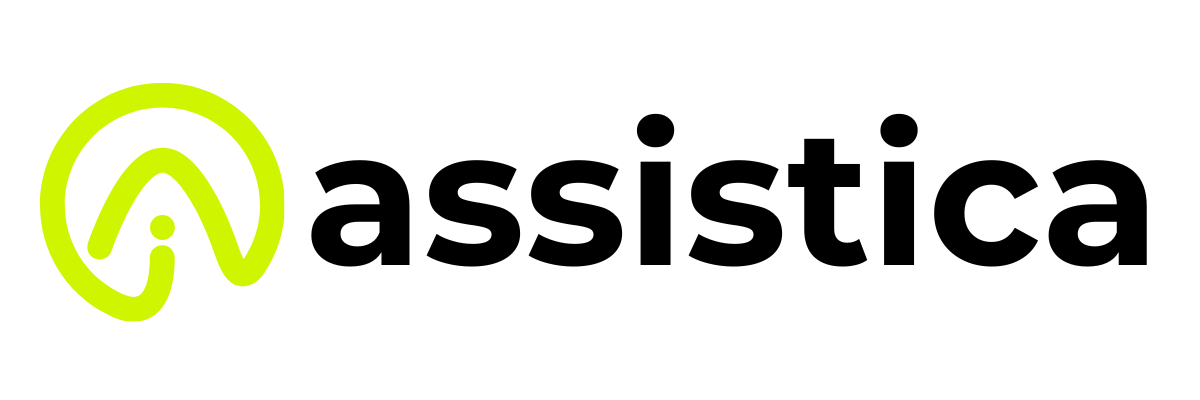Owing to the ever-changing dynamic nature of the business world today, being organized and having the ability to handle business work quickly has to be the most important aspect of conducting businesses ever. Task management software is an online ally of both teams and individuals to ensure the smooth flow of work and monitor its completion within deadlines. As remote work becomes reality and projects get more complex, companies require solid solutions that can meet their needs and requirements as they change.
Existing task management software includes functionality such as real time collaboration, automatic notification, custom workflow and more comprehensive reporting in order to ensure nothing gets under carpet. As a small start-up or a big company, the task management solution may be the right solution and may influence the productivity of your team, and its success in general.
What is Task Management Software?
Task management software Task management software is a computer-based tool that is made to assist individuals and teams to organize, plan, and trace their work-related activities effectively. They are centralized hubs where users can assign tasks, provide assignments, deadlines, and monitor the progress in real-time. Compared to paper-based systems or simple to-do lists, modern task management can combine all these sophisticated capabilities: collaboration functionality, automated processes, time management, and analytics.
These solutions allow the teams to break down large projects into small chunks, define dependencies among tasks, and provide communication within the project life cycle. Automating task administration workflows also enables companies to reduce errors, increase accountability and provide a better project deliverable as well as being mindful of the performance and workload distribution rates across a work team.
Why Task Management Matters in Modern Work
Task management is now considered a critical element to business success, directly influencing productivity, teamwork, and project completion schedules in our more complicated work environment.
- Productivity: Correct task identification prevents misunderstandings and enables teams to work on the most important tasks, leading to a significant increase in productivity.
- Responsibility: Well defined tasks and monitoring programs make team-mates to be responsible and achieve their duties and deliverables each time.
- Collaboration: With the centralized task platforms, team members can carry out their tasks or functions with easy communication and coordination in spite of their location or time zone differences.
- Visibility: Real-time project visibility allows managers to spot bottlenecks early on and make decisions regarding resource allocation and schedule changes.
- Efficiency: Automated processes and workflows help lessen redundant work, decrease the time spent on status updates and other administrative duties.
Challenges with Manual Task Tracking
In modern business practices, manual tasks tracking systems tend to pose bigger problems than solutions and cause inefficiencies and missed opportunities.
- Miscommunication: Written communication systems and email messages can lead to task ambiguity and information contradiction between group members.
- Lost Information: Paper notes and digital files that are stored randomly often get lost and end up forgotten or ignored, leading to forgotten and overlooked important tasks and deadlines.
- Less than perfect visibility: Manual tracking will almost never give you real-time information on project progress and distribution of workloads among the team members.
- Scalability Problems: Manual systems are very easily overwhelmed as projects become more complex and a team of people grows in size.
- Time Waste: It takes up valuable time to continually update spreadsheets and send status emails when this time can be used to do productive work.
Comparison Table (At-a-Glance)
| Name | Use Case | Best For | Rating |
| ClickUp | Custom task views and comprehensive project management | Teams needing flexible task visualization | 4.7/5 |
| Todoist | Natural language task entry and personal productivity | Individual users and small teams | 4.4/5 |
| Wrike | Scalable project planning and enterprise solutions | Growing teams and complex projects | 4.2/5 |
| Connecteam | Real-time task notifications and employee management | Field teams and mobile workforce | 4.3/5 |
| Trello | Visual project tracking with board-based interface | Creative teams and simple project management | 4.1/5 |
| Zoho Projects | Customizable project management and automation | Businesses using Zoho ecosystem | 4.2/5 |
| WorkFlowy | Outline-based planning and hierarchical organization | Writers and strategic planners | 4.5/5 |
| Freedcamp | Unlimited users and projects without cost restrictions | Growing teams on tight budgets | 4.5/5 |
| Smartsheet | Team performance tracking and detailed analytics | Data-driven organizations | 4.7/5 |
| Taskworld | Visual task boards and project timelines | Visual learners and design teams | 4.3/5 |
15 Best Task Management Software (Top Picks for 2025)
1. ClickUp
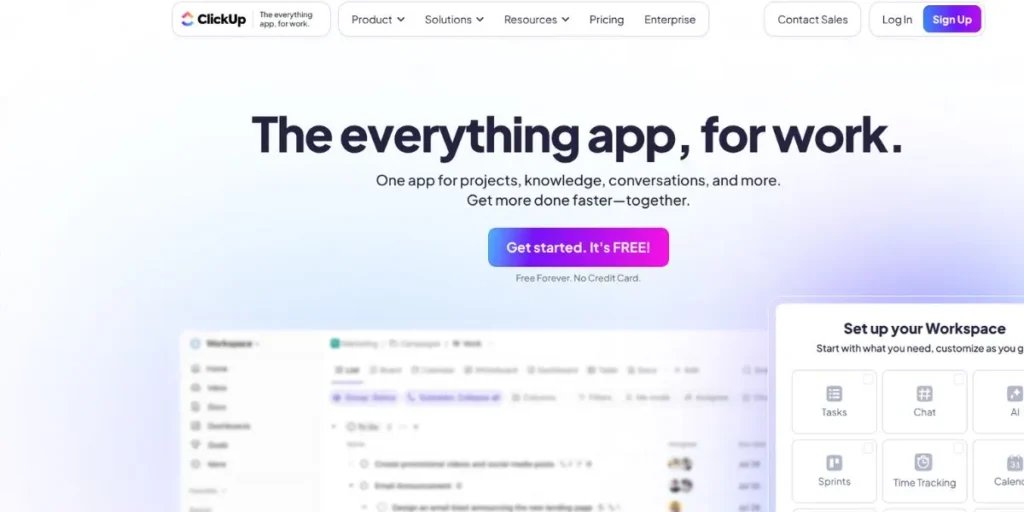
ClickUp is a comprehensive task management system and its customization capabilities are on par with no other. This platform is flexible to various work and project management requirements as it provides over 15 ways to view things. Kanban boards and Gantt charts allow users the freedom to customize the workflow to their liking with calendar views and even, custom dashboards.
It is designed so that it is compatible with more than 1000 third-party applications, and can integrate into an existing technology stack. The potent functions that ClickUp provides are the document management tool, goal management, time management, real time collaboration tools, and all this enables the user to deal with the project’s single-point control.
Key Features:
- Custom Views
- Document Integration
- Goal Tracking
- Time Management
- Real-time Collaboration
Pros:
- Extensive Customization
- Multiple Integrations
- Comprehensive Features
Cons:
- Learning Curve
- Feature Overload
- Storage Limitations
Best For: Teams requiring flexible task visualization
Pricing: $7/user/month
Website: https://clickup.com/
2. Todoist
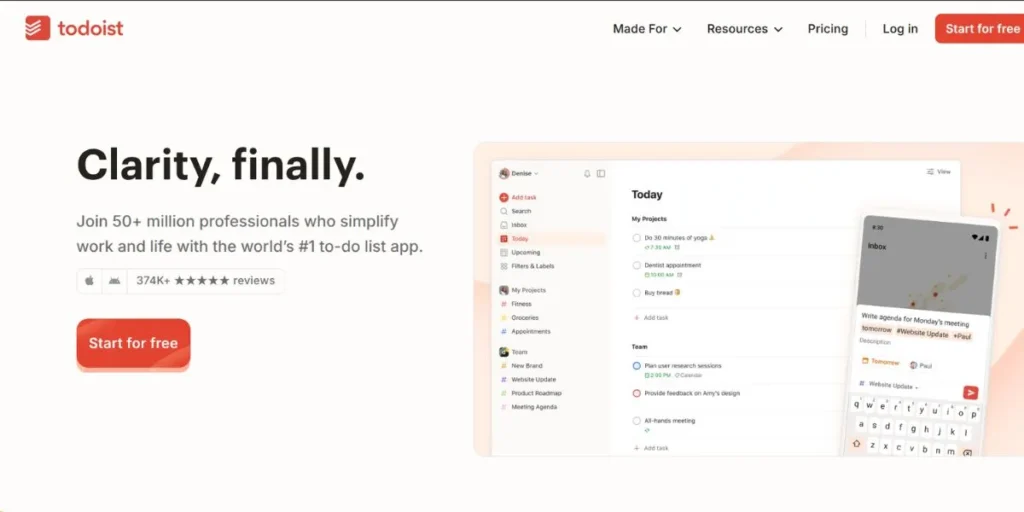
Todoist is the best task management software that places greater emphasis on natural language processing and the ease by which a user can add tasks. A person only has to enter an email client Friday at 3 pm and the auto scheduling will be made with that date, that time. This smart parsing option works with repeating tasks, as well, with optional schedule rules, like every third Thursday or two days after completion.
Its thoughtlessly simplistic qualities (clean and minimalistic user interface) coupled with a large organizational capacity. Todoist has got the cross platform synchronising facility which implies that the individual with the facility will also be monitoring his/her work wherever he or she goes without the need to bother where he or she is as long as he or she has access to the net.
Key Features:
- Natural Processing
- Smart Scheduling
- Cross-platform Sync
- Priority Levels
- Project Organization
Pros:
- Intuitive Interface
- Offline Access
- Smart Recognition
Cons:
- Limited Tracking
- Basic Features
- Advanced Paywall
Best For: Individual productivity and natural task entry
Pricing: ₹175 per user/month
Website: https://www.todoist.com/
3. Wrike
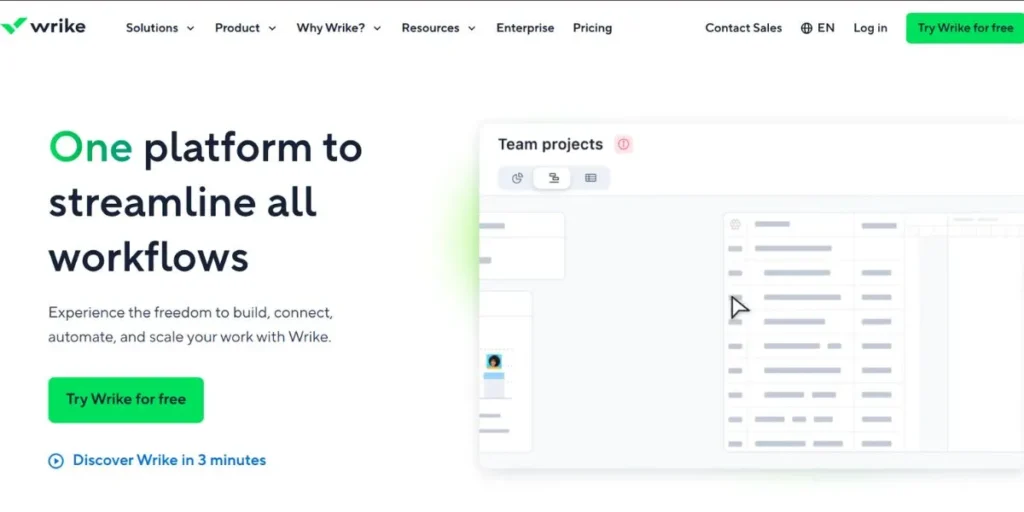
Wrike is an extensively scalable task manager that is expected to keep up with your organisation as your needs grow. It has well planned project planning features that come with a customizable workflow that can support a host of team designs and processes. Possibility of real-time teamwork and many report opportunities can help educate teams on the performance of the project and the number of resources done with a team.
The flexibility in Wrike becomes reflected in features, hence by default it can be used to drive forward one or two lists of tasks and complex projects with a set of steps and dependence and independent approval loops. The administrative and security capabilities are set at the enterprise level, and they can be consumed by the organization in areas that most suitably meet compliance requirements.
Key Features:
- Customizable Workflows
- Real-time Collaboration
- Advanced Reporting
- Enterprise Security
- Project Dependencies
Pros:
- Scalable Architecture
- Extensive Integrations
- Workflow Automation
Cons:
- Complex Setup
- Higher Pricing
- Annual Billing
Best For: Growing teams and scalable project planning
Pricing: $10 user/ month
Website: https://www.wrike.com/
4. Connecteam
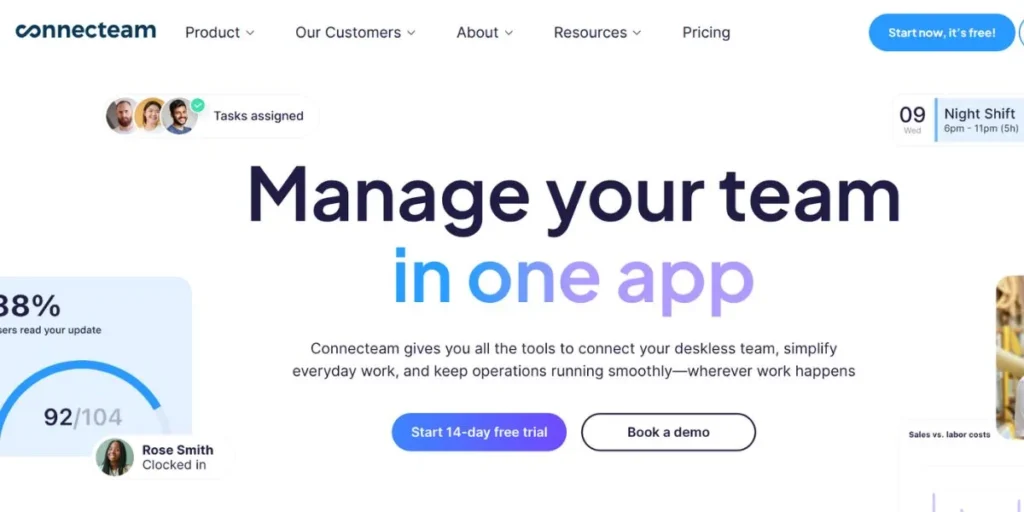
Connecteam is a multipurpose application which provides the management of tasks to field teams or mobile workforces. Live task updates succeed well on the site because all the employees working at home will never miss out on the tasks and updates in real time. It is mobile-friendly and will allow field workers to change the status of tasks, report and communicate with other workers with only little training required to utilize such an extensive application.
The time management features of connecteam are juxtaposed with the task management inputs provided by the managers in which tasks are assigned to the employees according to the availability of the employees. It also includes time tracking, form and communication tools and has been showcased as a fully fledged solution towards distributed team management.
Key Features:
- Mobile Optimization
- Real-time Notifications
- Scheduling Integration
- Time Tracking
- Communication Tools
Pros:
- Mobile Friendly
- Employee Engagement
- Custom Forms
Cons:
- SMS Issues
- Limited Features
- Desktop Experience
Best For: Real-time task notifications and mobile workforce
Pricing: 29 /mo
Website: https://connecteam.com/
5. Trello
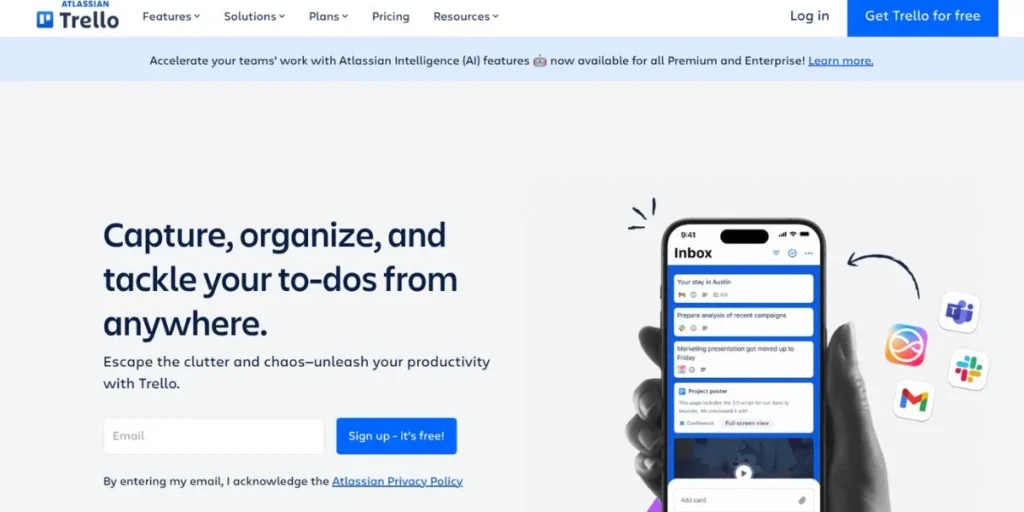
Trello is a visual task management software that breaks down any complex project into simple manageable boards with cards and lists. With the Kanban-type solution, it is incredibly easy to have groups of individuals perceiving project-related circumstances with a single look and track activities progressing through different completion phases. Not easy to get adapted to either as there has been a foundation that has been founded on the basis of drag and drop and any team player can have a go around it like any other team player whether he/she is a very technical person or not.
Butler is a very helpful automation tool in Trello that could help to minimize certain repetitive tasks by moving cards automatically, creating new tasks, and notifying people based on certain conditions. Trello is more specifically applicable as a visual product particularly when collaborating with creative teams and visual projects.
Key Features:
- Kanban Boards
- Drag-drop Interface
- Butler Automation
- Visual Organization
- Card Comments
Pros:
- Visual Interface
- Easy Learning
- Automation Features
Cons:
- Limited Reporting
- Card Clutter
- Basic Features
Best For: Visual project tracking and creative teams
Pricing: $5USD Per user/month if billed annually ($6 billed monthly)
Website: https://trello.com/
6. Zoho Projects
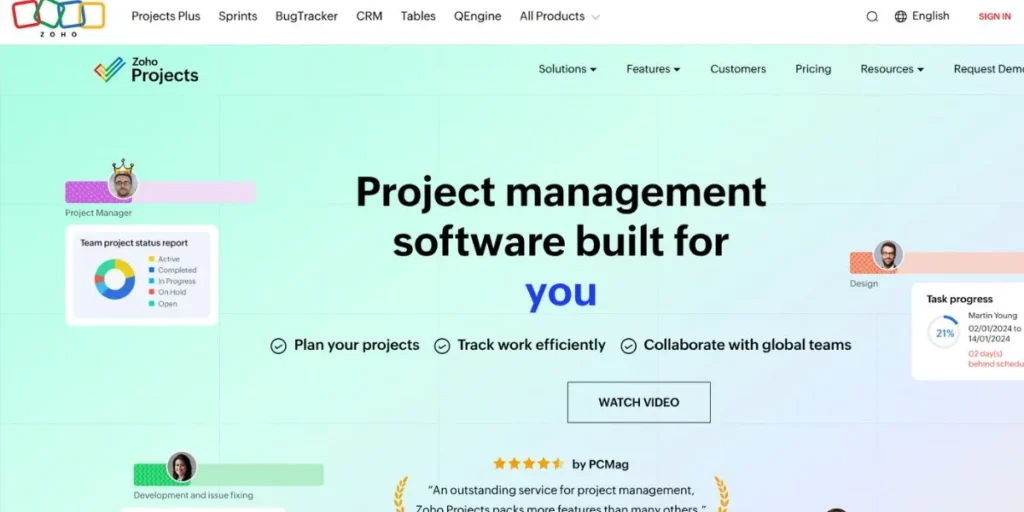
Zoho Projects produces the customisable task management software that can align with various business needs and workflows. Its ideal customizability is the best thing about it, since organizations can do their own fields, layouts, statuses and workflows with their own processes. The fact that the Zoho ecosystem is larger ensures that CRM can seamlessly integrate with other business apps, including accounting.
There are also a number of perspectives like Gantt charts, Kanban boards and normal list view so that the teams can work in the way which the respective teams used to work with. Much of the automation capabilities in Zoho Projects assist in reducing human labor by creating blueprints that provide task sequences and actions executed based on a prescribed set of conditions.
Key Features:
- Extensive Customization
- Multiple Views
- Automation Blueprints
- Zoho Integration
- Time Tracking
Pros:
- High Customization
- Ecosystem Integration
- Affordable Pricing
Cons:
- Mobile Limitations
- Learning Complexity
- Feature Restrictions
Best For: Customizable project management and Zoho users
Pricing: ₹280₹280 /user/month – billed annually
Website: https://www.zoho.com/projects/
7. WorkFlowy
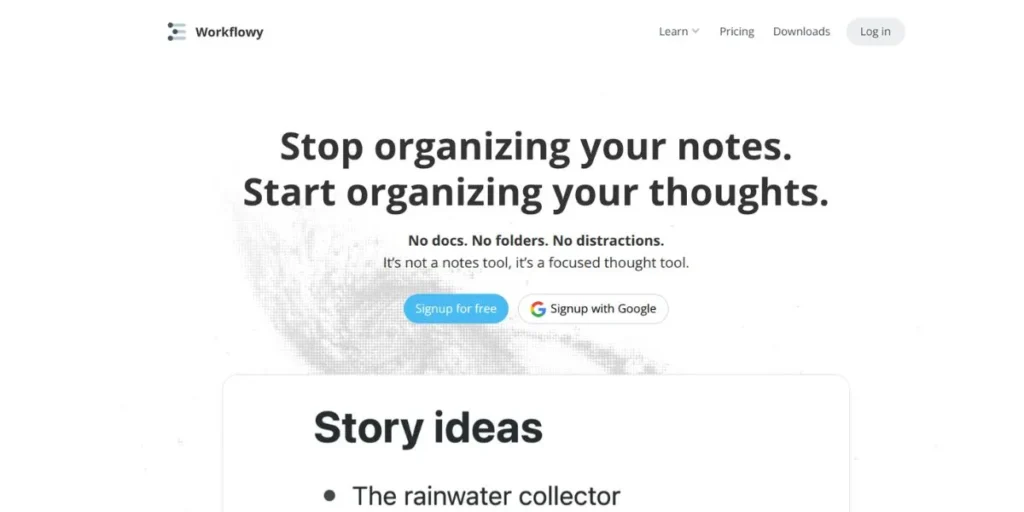
WorkFlowy presents a unique task management software approach through its outline-based planning system that resembles an infinitely expandable document. The hierarchical design type gives a user a chance to break down large and complex projects into smaller and more specific sub-elements and retain the big picture perspective of the whole project.
It is a subtle side of the site that lacks distractions and focuses more on the work and the production of work as opposed to graphic flashiness. This zooming feature of the WorkFlowy enables the users to zoom into sections of the project and have the awareness of the bigger project. Long-term planning, writing, and projects in which you require a comprehensive breakdown and organization lend itself particularly well to this type of style.
Key Features:
- Infinite Nesting
- Zoom Focus
- Tagging System
- Search Functionality
- Minimalist Design
Pros:
- Simple Interface
- Unlimited Depth
- Cross-platform Access
Cons:
- Limited Visuals
- Basic Features
- Monthly Limits
Best For: Outline-based planning and hierarchical organization
Pricing: $6.99 /month
Website: https://workflowy.com/
8. Freedcamp
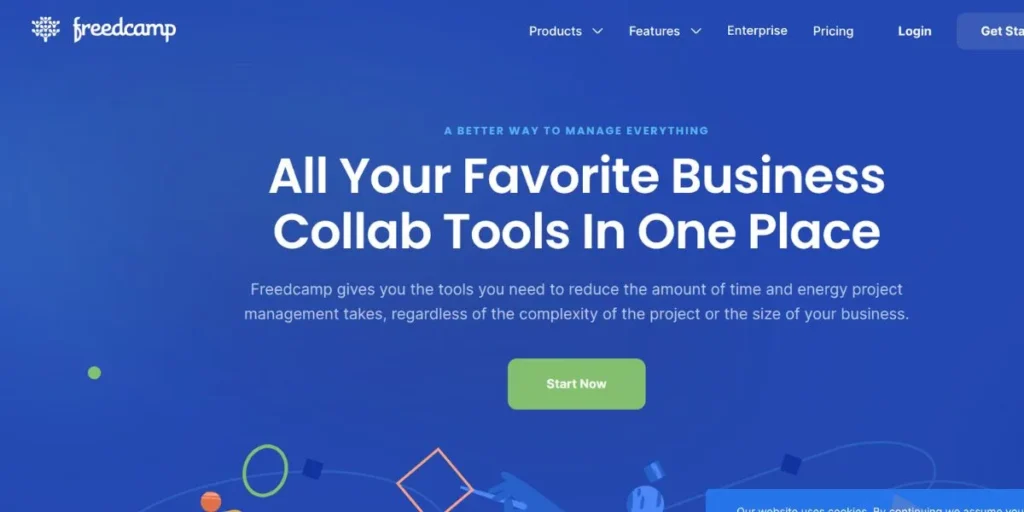
Freedcamp provides exceptional value as a task management software by offering unlimited users and projects without additional costs. Specifically, it is the best choice of those teams whose size has already approached the point when they start thinking about expanding; or, more appropriately, they do not need to think about paying fees on a per-user basis.
Some of the platform features include full project management such as: task lists, Kanban boards, Gantt charts, time tracking and invoicing. At Freedcamp, groups decide on what they would like to discover or conceal what they dislike within a project to attain clean and devoted interfaces. The collaboration that is found within the platform are user discussion boards, file sharing and real live updates to keep the team members in contact and informed that the process project implementation is underway.
Key Features:
- Unlimited Users
- Multiple Views
- Time Tracking
- Invoicing Integration
- File Management
Pros:
- No User Limits
- Comprehensive Features
- Cost Effective
Cons:
- Interface Learning
- Premium Features
- Monthly Costs
Best For: Unlimited users and budget-conscious teams
Pricing: $ 1.49 per user / month
Website: https://freedcamp.com/
9. Smartsheet
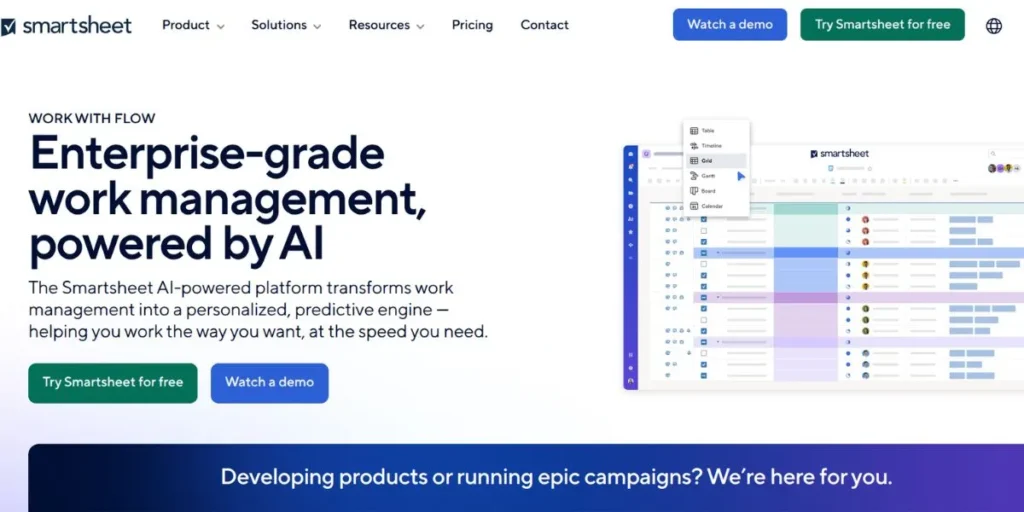
Smartsheet is an organization that focuses on performance management software which entails task management and a more elaborate analysis and understanding of team productivity. The platform maintains a relevant account of time spent in the accomplishment of the work too to plan resources and budget the project since with time sheets, time is automatically accounted for on a particular task. Through its dashboard, it shows real time status of all the work running and the projects in progress with the priorities and any bottle necks appearing at the top.
An in-depth analysis can be part of the performance monitoring requirements and may be used to define the trend of productivity and improvements. The visibility features of Smartsheet give the staff members the feeling of being able to see what is happening in the project and how much work their co-workers have so that they are able to feel responsible and collaborate on the project.
Key Features:
- Automatic Tracking
- Performance Analytics
- Real-time Dashboard
- Transparency Tools
- Budget Management
Pros:
- Detailed Analytics
- Automatic Tracking
- Performance Insights
Cons:
- User Minimum
- Limited Integrations
- Annual Billing
Best For: Team performance tracking and data-driven organizations
Pricing: $19 per Member/month
Website: https://www.smartsheet.com/
10. Taskworld
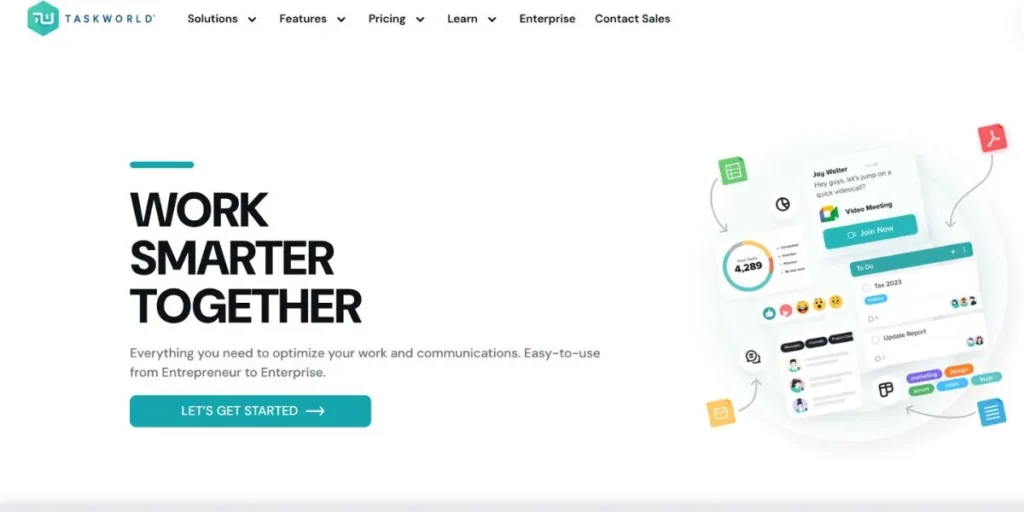
Taskworld specialises in visual task management software through its simple board based interface and complete project planning software. The program adds the convenience of a visual task board, including additional features like performance data analytics, and team messaging. Tasks can be effortlessly tracked and project timelines and dependencies easily managed with customizable workflows.
Tasksworld: Tasksworld does not involve any external messaging software and internal communications are embedded into the software, therefore, all communications are easily searchable and exist as part of one software. The platform analytics provide insight into team performance, how quickly they complete their work on the project and project health, enabling them to make decisions based on the analytics to enhance the project.
Key Features:
- Visual Boards
- Project Timelines
- Built-in Chat
- Performance Analytics
- Custom Workflows
Pros:
- Visual Interface
- Integrated Communication
- Advanced Analytics
Cons:
- Higher Pricing
- Annual Requirements
- Feature Limitations
Best For: Visual task boards and design-oriented teams
Pricing: $15/user/month
Website: https://taskworld.com/
11. Basecamp
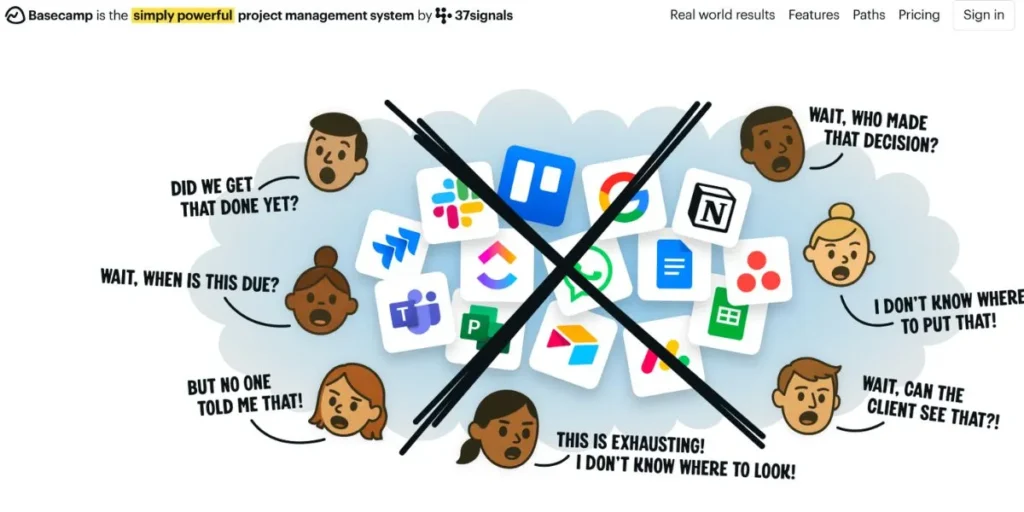
Basecamp is a versatile technology in task management that prioritizes workflow-based automation and visualisation of tracking projects. There is also the appealing user-friendly interface which provides teams with an overview of the projects and tasks status on the platform. Its automation functionality assists a team to both remove redundancy in their efforts and to even give processes across projects a standard operating procedure.
Basecamp is a flexible software that allows teams to build their own workflow based on their particular focus (which can be as basic as a task board or as complex as a multistakeholder project management board). The platform integration capabilities are associated with familiar business applications and they make the platform a central point to execute all the activities and communications of the project.
Key Features:
- Workflow Automation
- Visual Dashboards
- Custom Workflows
- Integration Hub
- Timeline Views
Pros:
- Intuitive Interface
- Strong Automation
- Flexible Workflows
Cons:
- Pricing Complexity
- Learning Curve
- Feature Overload
Best For: Workflow automation and visual project management
Pricing: $15/user per month
Website: https://basecamp.com/
12. Asana
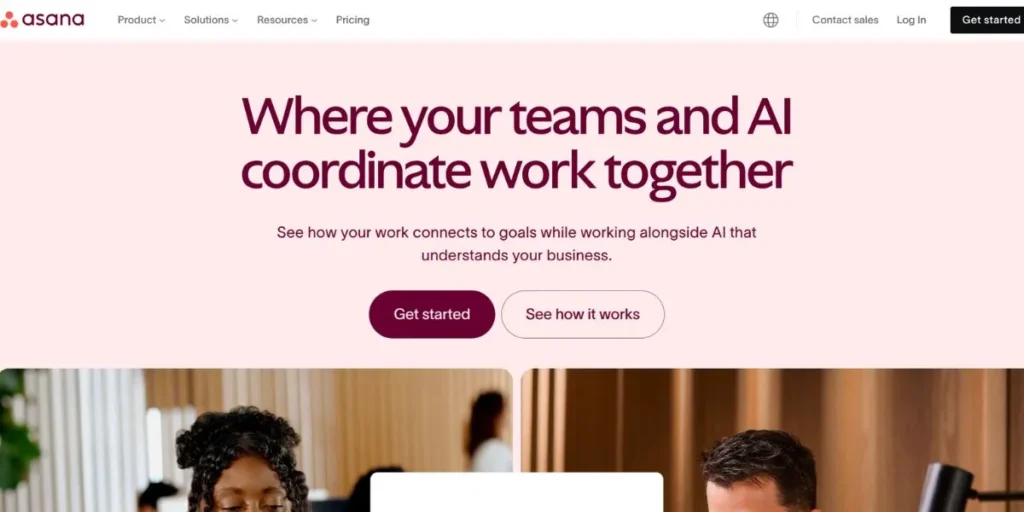
Asana offers a product that is simple to use and has strength in its project management application, which is an integrated task management platform for companies. The task prioritization part is also a great addition to the site because of the clear hierarchy of the platform and access to other views like lists, boards, timeline, and calendar view. Project templates can help the Anasana team launch earlier with a defined workflow, and custom fields and forms enable the capture of structured information regarding work.
The platform would include goal tracking software that would unveil the relationship between the work of the day and the organizational big goals that can help to align that all together. The Asana collaboration functionality is proofread, live remark, progress notifications, what locations bed and breakfast the stakeholders know about but not provided by bed and breakfast in the form of notifications.
Key Features:
- Task Prioritization
- Multiple Views
- Goal Tracking
- Project Templates
- Proofing Tools
Pros:
- Clean Interface
- Strong Collaboration
- Goal Alignment
Cons:
- Advanced Features
- Reporting Limitations
- Complexity Growth
Best For: Task prioritization and goal-oriented teams
Pricing: US$10.99
Website: https://asana.com/
13. Notion
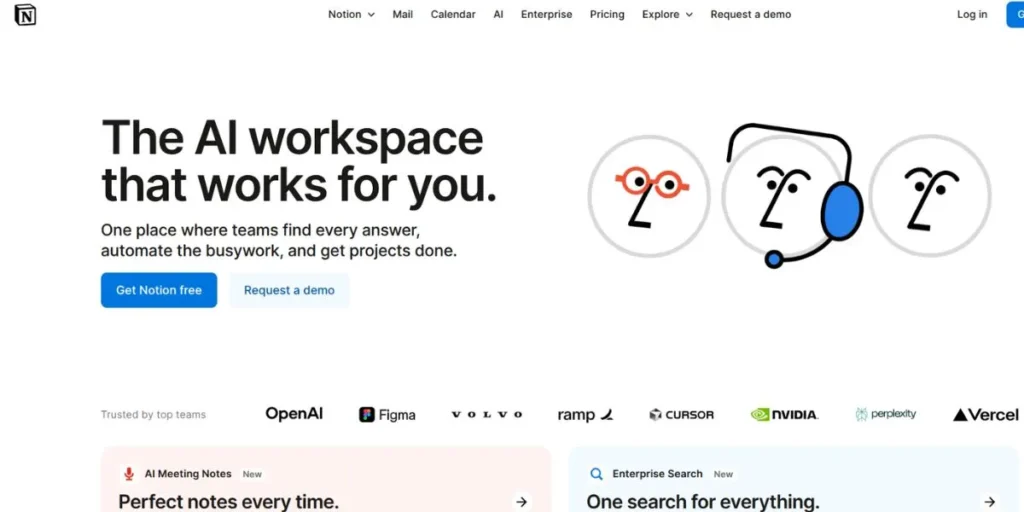
Notion is all-in-one, task management software that also includes a task tracking feature, knowledge management feature and database feature. This is a unique ability in its own right as it enables teams to develop holistic working spaces, with which work is connected through relevant documentation, meeting notes, and projects. The block structure of notion lets you be as flexible as you need to be with how you organize the information, be it a list of things to do or a complex database of projects with your own custom properties and relationships.
An assortment of templates offers a pre-cooked solution to a bazillion assorted applications, and the mind-bending database technology offers the opportunity to open, sort and report functions. The collaborative aspect of notion can enable a team to coordinate the process of sharing work and knowledge within a single platform.
Key Features:
- All-in-one Workspace
- Database Integration
- Block Structure
- Template Gallery
- Knowledge Management
Pros:
- Incredible Flexibility
- Documentation Integration
- Cost Effective
Cons:
- Steep Learning
- Performance Issues
- Complex Setup
Best For: Integrated notes and tasks with documentation needs
Pricing: $10 per member / month
Website: https://www.notion.com/
14. nTask
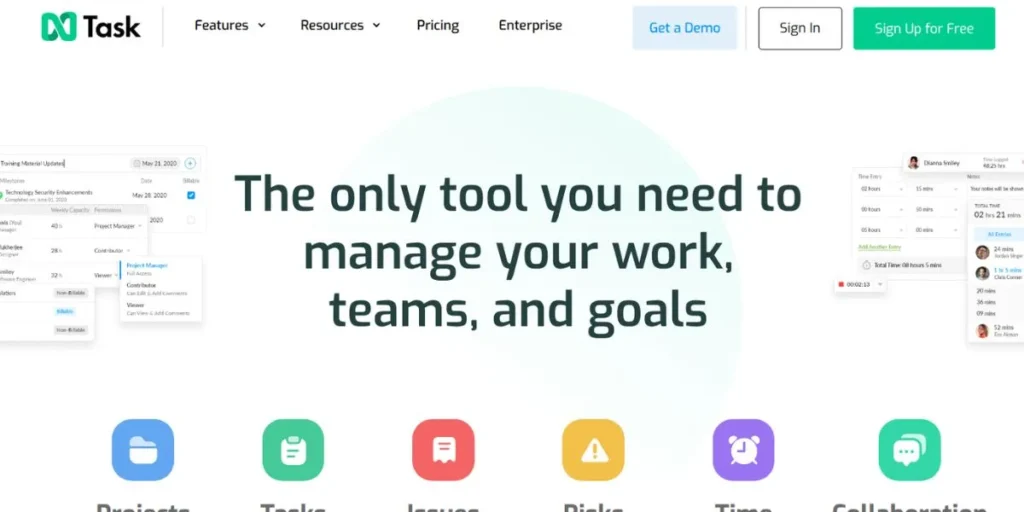
nTask is a simplified task management tool that has the golden risk management functions that helps the team to determine and mitigate the risk of potential issues in the project. The platform also incorporates classical profile management not to mention project planning tools like Gantt charts, time management, and teamwork provisions within risk management provisions of nTask in enabling teams to capture potential risks, mitigation strategies, and risk status throughout their project implementation.
The ability to plan, administer and follow-up on meetings effectively by capturing and tracking action items is made possible by meeting management capabilities within the platform. The nTask budget tracking facility provides insight on the costs of the project and the use of resources.
Key Features:
- Risk Management
- Gantt Charts
- Meeting Management
- Budget Tracking
- Team Collaboration
Pros:
- Risk Integration
- Comprehensive Features
- Affordable Pricing
Cons:
- Limited Customization
- Basic Reporting
- Integration Gaps
Best For: Integrated risk management and project planning
Pricing: From $3/user/month
Website: https://www.ntaskmanager.com/
15. MeisterTask
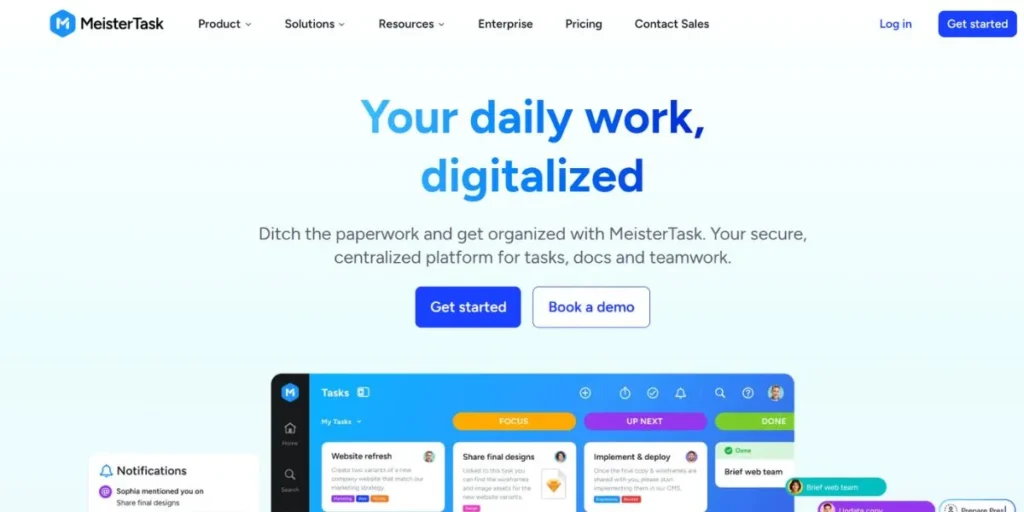
MeisterTask is the final software in our list of beautiful task management software with smooth design and easy user interface. Most of the platform boards with the Kanban style are very visual and can be easily configured to fit specific processes and activities particular to a specific team. MeisterTask can be completely integrated with mindMeister, which is the only app that combines both mind mapping and task execution.
The possibility of platform automation minimizes the number of manual working hours as all tasks are automatically adjusted, set, and changed as the established rules allow and the tasks are delegated. MeisterTask is also sensitive to the user experience in the extension of their applications in their mobile platform which can give all the features of not only managing tasks but also collaborating with colleagues all at the same time.
Key Features:
- Beautiful Design
- Kanban Boards
- Mind Map Integration
- Task Automation
- Mobile Excellence
Pros:
- Stunning Interface
- Easy Learning
- Mind Mapping
Cons:
- Limited Reporting
- Feature Restrictions
- Pricing Tiers
Best For: Visual project boards and design-conscious teams
Pricing: $7 Per User/Month
Website: https://www.meistertask.com/
How to Choose the Right Task Management Software
In order to find the appropriate task management solution, you need to take into account the personal needs of your team and workflow, as well as organizational constraints that would allow using the solution to the maximum and hopefully make the most out of its benefits.
- Features: Evaluate against your team-based workflow: basic functionality, work tracking tools, collaboration features, and reporting features.
- Scalability: How does the platform scale as the team grows, the type of projects increases, and businesses change their needs?
- Integration: Assess interoperability with other installed systems and tools as part of your technology stack to assist in sustaining continuity in your data flow and other workflows.
- Budget: Standards: Compare pricing options, e.g. per-user, features, fixed cost vs price charged by each service.
- Usability: Test user interface design, learning curve requirements, and mobile availability to ensure team members are actually going to learn and use the system.
Conclusion
The task management system is at its dynamic level because it offers teams emerging opportunities that have never been witnessed to attain high productivity, team cooperation and concurring success rates on projects. Simple visual boards and a huge selection of project management suites are examples of the modern solutions to a wide variety of needs and working styles of organizations.
The secret behind this is to identify a platform that can be adhered to by your team and its requirements, the development pattern and a technological foundation. You need to work on natural language task entry and project tracking, or more advanced analytics – there is a task management software that will be compatible with your usage. By making the appropriate investment in the tool and putting the appropriate implementation in place, organizations are able to reverse the fortunes of their project management capabilities and document an improvement in the outcomes of their entire endeavors.
FAQs
what is task management software
Task management software refers to an online service where individuals as well as teams can manage their work tasks effectively by assigning them, tracking their progress and meeting in a centralized place to assist individuals and groups to organize, prioritize, plan and focus on the activities they have to be done at a particular time.
what is the best task management software
Our top task manager is team-specific and all three rated highly due to their wide capabilities, customization, and scaling depending on use.
how does invoicing software support task management
Invoicing software helps facilitate the efforts of the service based business since it automatically invoices in line with the time tracked and work done and simplifies the efforts of the business executing project with expenses being collected in forms of bills.
what type of software manages tasks dependencies and timelines
Gantt chart project management software enables task dependencies and schedule, and presents task relationships to each other and critical paths through project schedules.
how to choose the best retail task management software
Select optimum task management software in retail by considering Inventory integration, multiple location support, employee scheduling options, customer service task tracking, and mobile capability to access field operations management.
